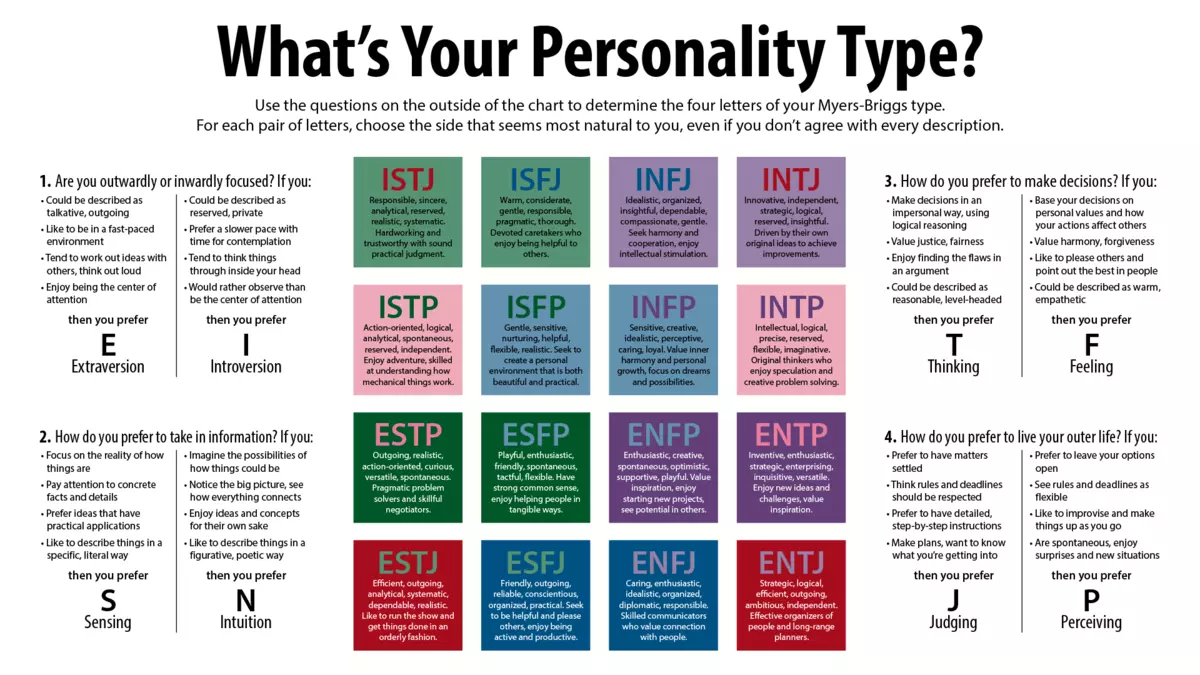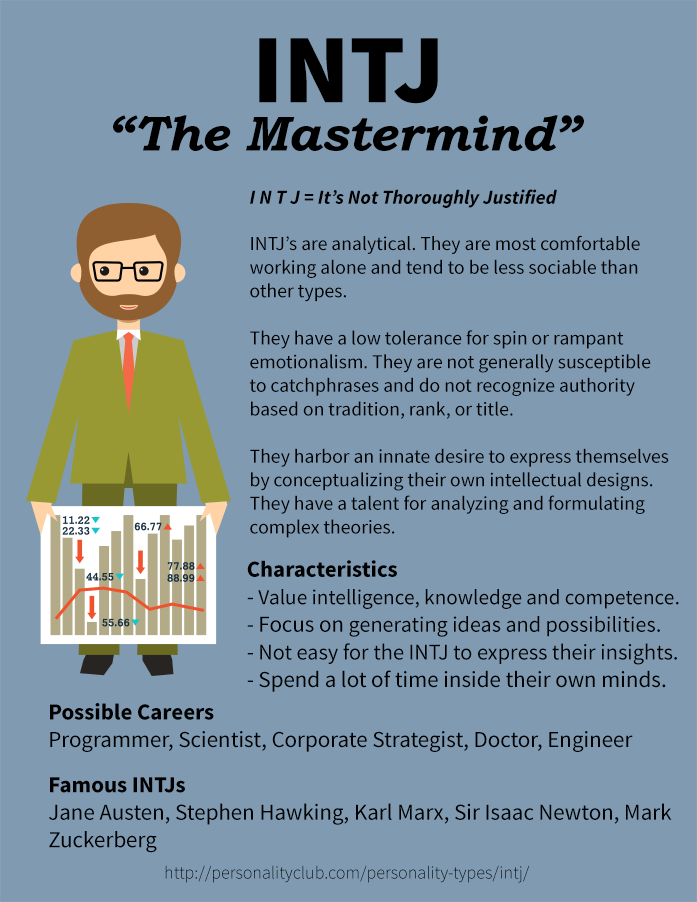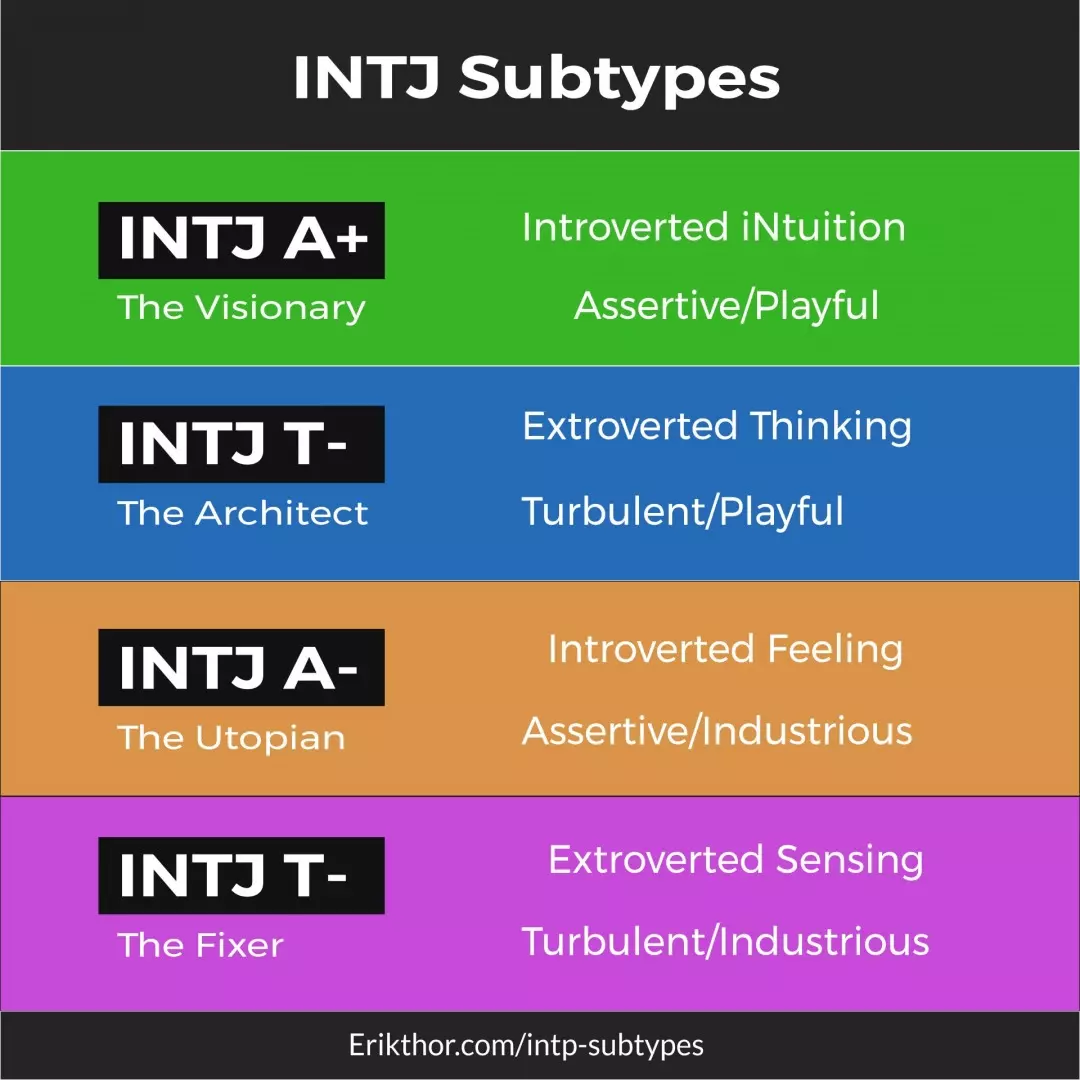Comments
- No comments found

INTJs are analytical problem solvers that can spot easily all your mistakes and help you fix things accurately. INTJ are also strategic, highly self-sufficient and hate being vulnerable to anything.
IN’s in general are people who are intuitive and introverted.

Source: Regain
Introversion is largely biochemical - people who are introverted typically have a very low threshold at which neurons fire, which in turn translates both into a tendency to become easily overstimulated and a tendency to create new neural configurations more quickly.
Recent work in understanding brain structure shows that neural circuits create what amount to fractal patterns of varying degrees of complexity. At the upper end, this can be thought of as being “11-dimensional” though that’s primarily a way of different types of network structures - it is still three dimensional, but it exhibits levels of abstraction that you’d expect to see in something like one of those Mandelbrot screensaver that were so popular a few years back.
These are consistently changing and reconfiguring as we think, at around thirty times a second. If you have a higher sensitivity, it means that you end up creating more complex, higher dimensional structures at a rate of thirty Herz, which correlates directly with the ability to form abstractions - what can be thought of as castles in the mind’s sky. However, this also tends to mean that more of that person’s physical energy is going towards keeping those abstractions from crashing down, and that in turn draws energy away from external stimuli. In effect, an INXX tunes out things like time-keeping, awareness of what’s in front of them, eating and so forth. This includes that part of the brain that is responsible for awareness of self. They are more effective at whatever they are doing, but are usually the last to know that the house is on fire.
Another way of thinking about this is that most people have a single dominant personality (their consciousness). The intuitive, on the other hand, often has a suite of personalities, and can tailor those personalities dynamically. This especially comes into play with INFPs and Js, who tend to become writers and method actors disproportionately. The INFx personality is looking for patterns in people, and they are often very observant in being able to then “get in other people’s heads” through mimicry and mirroring functions, though the more intuitive ones are also likely to spend a great deal of time “world-building”.

Source: Personality Club
INTs are also generally system thinkers, who can keep a number of complex systems working in their head simultaneously. These people are “smart” in that they can look at problems from many different angles, and can usually see patterns because they think both abstractly and metaphorically. INTJs often tend to be involved with code of various sorts, and usually have very good memory and a bias towards reductionism - reducing a complex system to its pieces. INTPs, on the other hand, may have “terrible” memory, largely because their world view is much more synthetic and relational, but that “poor memory” actually disguises the fact that they know a prodigious amount about damn near everything, and they have to develop their own indexing mechanisms to find it. INTJs like working within systems, INTPs like building systems.
This is actually a pretty good indication of the distinction between J and P attributes. Js are very good at sorting things into categories quickly - given a set of rules for sorting things, Js can organize by need, requirements, functions, cost or any other set of criteria. They often have an excellent memory for faces, and love puzzles that require them to develop solutions. P’s on the other hand are often more fascinated by the rules themselves, and are much more inclined to play “what if”. They are attracted to language, metaphor, and the nature of patterns. They are more likely to be analysts, mathematicians, ontologists, scientists and so forth, people who ask “why” rather than “how” - and all of this is very much a function of the fractal foaminess of their brains.
So given this, it also gives an indication of why extroverts are probably less likely to appear “smart”. Again, this goes back to how often neurons fire (and actually is affected by things such as the myelin sheathing around nerves, which tends to be thicker in extroverts). Dopamine is a particular neurotransmitter that is part of the biochemistry of the brain, and is related to epinephrine, also known as adrenaline.
Extroverts need more of either dopamine or adrenaline to stimulate neural activation, which results in somewhat lower dimensional neural structures forming or breaking apart. This means that the brain is using less energy, but this also means that there is more energy available for sensory activity - observing, feeling textures, increased kinesthetics and so forth. Their sense of external awareness is much higher, and they are more likely to seek out activities that will pump endorphines like adrenaline and dopamine into their system - as well as more likely to focus on sex and social interaction. They have a greater sense of egotism as well. Taken to extremes, extroversion can manifest as narcissism and poor self-reflection.
The extrovert personality is usually much more aware of social rules and constructs, and especially with the J component, can become dogmatic, but also can excel in areas where orthodoxy - clear rules or categorizations, tend to apply. Just as IN personalities tend to cluster, so do ES ones (an IS is usually an ES who suffers from anxiety, while an EN is usually an IN who conquered the sometimes crippling insecurity that most young INs face early). Indeed, certain variants of the MBTI now include another asset called assertiveness that provides a gauge of how likely a person is to be proactive in a group. This has the additional benefit of moving the MBTI model to the same number of attributes as the Big Five used by most modern psychologists and psychotherapists, though there is still some minor disagreement about what is being measured.
The irony of all this is that the most financially successful of the categorizations cluster in the ES range. When the rules are known, confidence can be more compelling than actual competence. Extroverted sensors are more likely to go with their gut rather than slow, thoughtful analysis, but this usually also means that while the introverted analyst will often make the better decision, the extrovert will make three or four in the same time that serve primarily to reduce uncertainty, even if they are ultimately poor decisions.

Source: Erik Thor
Put another way, each personality has its strengths and its weaknesses, optimizing on certain facets at the expense of others. The MBTI has some limitations. I think that intuitiveness and introversion are fairly tightly coupled, as an example, which is a bad thing in a psychological model. Yet for all of that, I think the upshot of this is that if you think of intelligence as being how your personality is optimized rather than as a single static number, it can give you a much better definition of true intelligence than any one particular facet.
Kurt is the founder and CEO of Semantical, LLC, a consulting company focusing on enterprise data hubs, metadata management, semantics, and NoSQL systems. He has developed large scale information and data governance strategies for Fortune 500 companies in the health care/insurance sector, media and entertainment, publishing, financial services and logistics arenas, as well as for government agencies in the defense and insurance sector (including the Affordable Care Act). Kurt holds a Bachelor of Science in Physics from the University of Illinois at Urbana–Champaign.
Leave your comments
Post comment as a guest